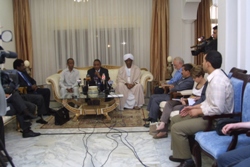Sudanese official warns of “Tsunami” if Bashir indicted by ICC
September 9, 2008 (AMMAN) – The Sudanese Justice Minister Abdel-Baset Sabdarat warned of a political “tsunami” if the judges of the International Criminal Court (ICC) issue an arrest warrant for Sudanese President Omer Hassan al-Bashir.

Some Sudanese officials hinted that they may ask UN missions in the South and Darfur to leave if Al-Bashir is charged by the ICC.
The ICC’s prosecutor Luis Moreno-Ocampo announced in mid-July that he requested an arrest warrant for Al-Bashir.
Ocampo filed 10 charges: three counts of genocide, five of crimes against humanity and two of murder and accused Al-Bashir of masterminding a campaign to get rid of the African tribes in Darfur; Fur, Masalit and Zaghawa.
Sabdarat who was speaking to reporters in Jordan said that if the judges endorse the charges against Al-Bashir “it will lead the entire region into a devastating earthquake which will burn not only the fingers of those who are orchestrating these charges, but their livers as well”.
“The Sudanese people are not like other people. If you describe them [Sudanese people] as Arabs then they are and if you said they are Africans then they are Africans. The Sudanese people staged three revolutions and they will refuse ousting their leadership and the government and will burn the region” he added.
The Sudanese official accused foreign powers of targeting his country through “sanctions, war and bombing factories”. He further said that the ICC move aims to “break the respect of Al-Bashir has by his people”.
Yesterday Sabdarat handed the Jordanian King Abdullah II a letter from Al-Bashir. The Jordanian news agency (PETRA) said that the letter contained Khartoum’s view with regards to the latest developments of its row with ICC.
King Abdullah told the Sudanese official that Jordan is “keen on preserving the security and stability of Sudan as well as achieving national reconciliation and strengthening peace all over Sudan” PETRA reported.
The Sudanese delegation included some legal experts who, along with Sabdarat, met with the Jordanian Justice minister Ayman Ouda. The two sides reportedly discussed the ICC issue and “coordinating efforts in legal matters regionally and internationally”.
Jordan is one of three Arab states which are party to the ICC Statute which may explain why King Abdullah avoided making public comment criticizing the Hague based court.
Some Sudanese officials have suggested that they may deal “indirectly” with the ICC through a third country that is a member of the court to challenge the proceedings in the Darfur case.
The country named to play that role was another Arab country. Djibouti. However under the ICC Statute only the State or the accused may challenge the admissibility of a case or the jurisdiction.
Sabdarat reiterated his country’s position not to hand over any suspects to the ICC before adding that he does not accept “for someone to commit a crime and go unpunished”.
“Sudanese courts are willing and able to investigate crimes committed” he stressed.
But today the United Nations special rapporteur on Sudan accused Khartoum of affording impunity to those who abuse human rights in the war-torn region.
“A culture of impunity is prevalent; the state fails to investigate, punish and prosecute perpetrators of human rights violations” she said.
Last month Sudan appointed a special prosecutor to look into rights abuses committed in war ravaged region of Darfur since 2003. It was also reported that the prosecutor may investigate a militia leader wanted by the ICC who was previously cleared by Sudanese courts.
However many lawyers and politicians inside Sudan dismissed the step as “belated” and an attempt to circumvent the ICC work.
Sudan has not ratified the Rome Statute, but the UNSC triggered the provisions under the Statute that enables it to refer situations in non-State parties to the world court if it deems that it is a threat to international peace and security.
(ST)
